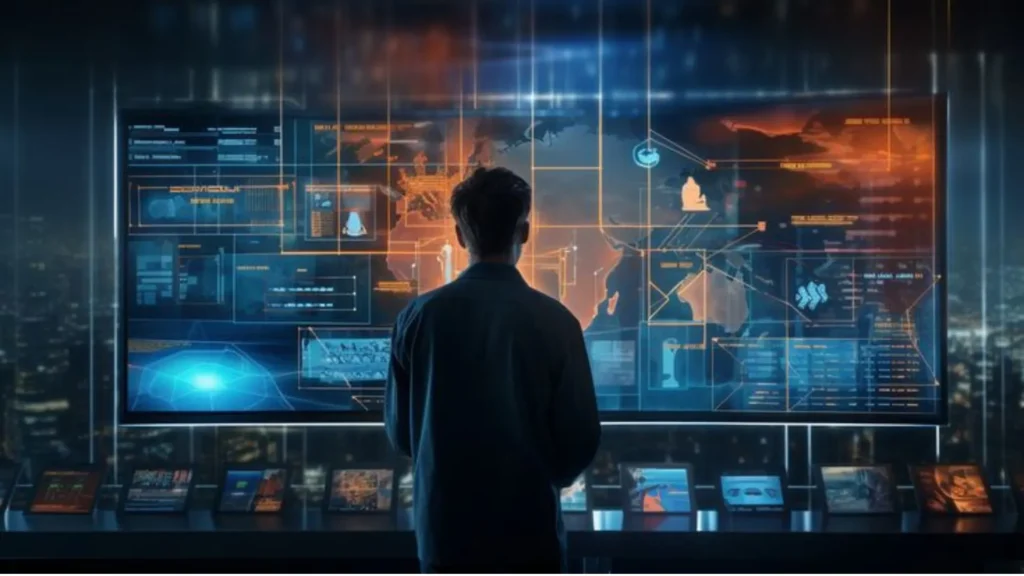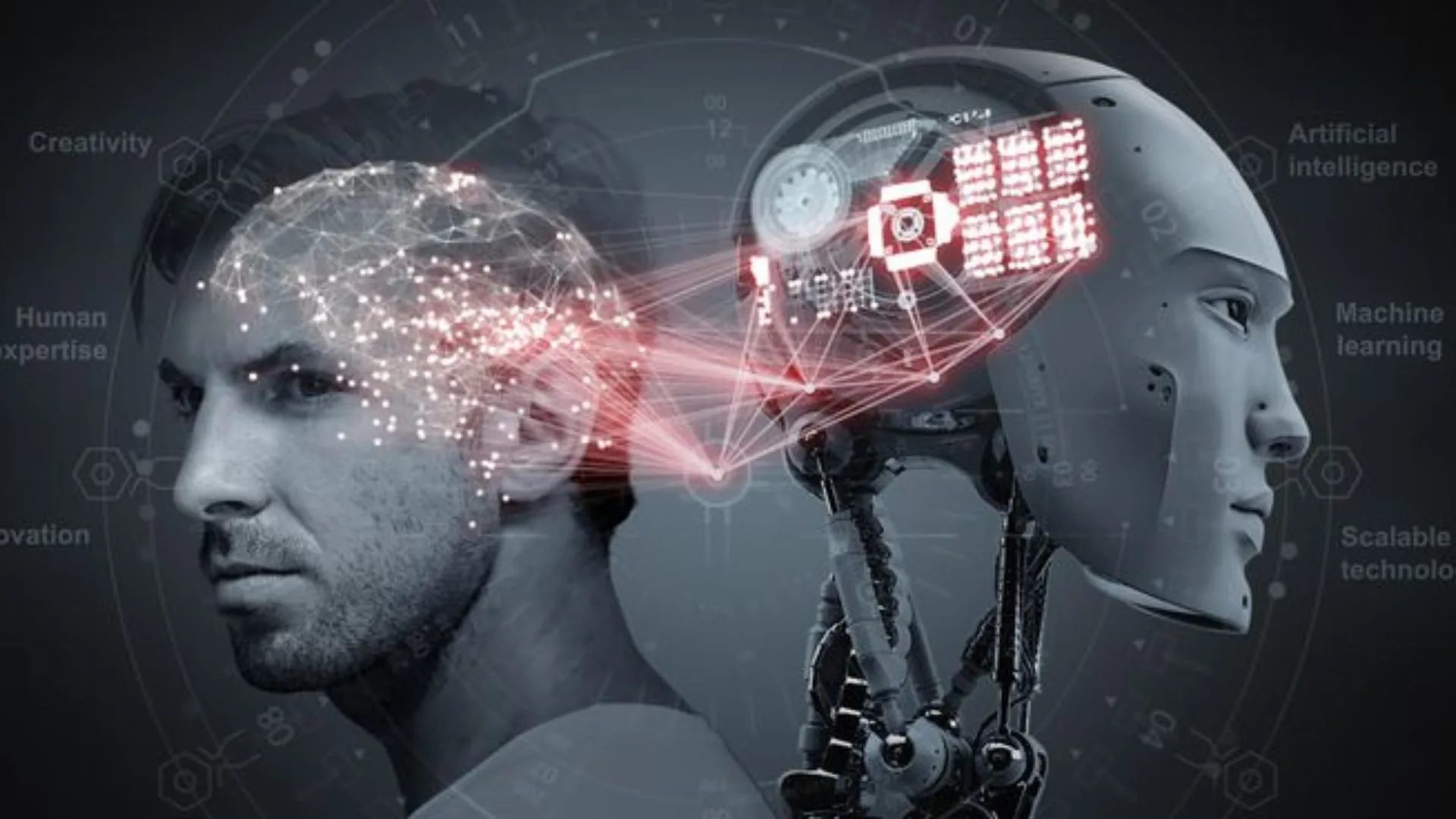Introduction
Now, what happens when something vastly smarter than the smartest person comes along and is looking for?
It’s very difficult to predict what will happen in that circumstance. Artificial intelligence is evolving at an unprecedented pace.
What started as simple rule-based systems has rapidly advanced to AI that can write, code, strategize, and even predict human behavior.
But that’s just the beginning.
It’s warned that AI could soon match human intelligence, surpass it, and eventually becomes something far beyond our control.
So how far can AI really go?

And what are the 10 levels that markets journey from basic automation to a godlike intelligence that could reshape reality itself? Let’s break it down.
Starting from the simplest systems to the AI that could redefine the universe as we know it.
Because that all repetitive human work that doesn’t require the deep emotional connection between two people, that will all be done in the next couple of decades, better, cheaper faster by AI.
Level one, rule-based AI
The first level of AI is rule-based AI, sometimes called expert systems.
This is the simplest form of artificial intelligence.
It follows predefined rules without any ability to learn, adapt, or evolve.
You see rule-based AI everywhere, even in basic appliances, like alarm clocks, thermostats and microwaves.
If your alarm goes off at 7 a.m., or your thermostat adjusts based on the temperature, that’s rule-based AI at work.
In businesses, rule-based AI automates tasks like invoice processing, email filtering, and spam detection.
These systems are useful but extremely limited.
If something unexpected happens, like a new type of spam email, it won’t recognize or handle it. This is the AI we had decades ago.
Now let’s move up to the next level, where AI starts responding to its environment. This is extremely important.
I think the danger of AI is much greater than the danger of nuclear warheads by a lot.
Level two, context-based AI
Like rule-based AI, context-based AI doesn’t just follow fixed instructions.
It processes information in real time, considering factors like location, past interactions, and user behavior.
If you’ve ever asked Siri, Alexa, or Google Assistant for the weather, and then received a recommendation to take an umbrella, that’s context-aware AI at work.
It analyzes your question, cross-references it with weather data, and suggests an action.
Netflix, YouTube, and Amazon use context-based AI to recommend content based on your watch history, engagement patterns, and even what’s trending.
This is why your recommendations change over time. The AI is constantly learning from your behavior.
But as impressive as it sounds, context-based AI is still reactive. It can’t create or think for itself. The next level of AI does exactly that.
Level three, Narrow AI
At this level, AI is no longer just reacting. It’s mastering tasks that even humans struggle with. But there’s a catch.
It’s only good at one thing.
This is called narrow AI, or weak AI, an intelligence that outperforms humans in a single domain, but cannot generalize beyond that.
Some real-world examples highlight its capabilities.
IBM Watson processes medical data and detects diseases faster than doctors, revolutionizing diagnostics.
AlphaGo defeated the best human-go players by analyzing millions of past games, proving AI’s ability to excel in strategy-based environments.
Meanwhile, AI-powered financial trading predicts stock market trends with unreal accuracy, giving investors an edge like never before.
In 2023, Google’s DeepMind developed AlphaFold, an AI system that solved a 50-year-old biological mystery by accurately predicting the structure of nearly every known protein.
This breakthrough could transform medicine and drug discovery by dramatically accelerating research.
But here’s the problem.
AlphaGo can beat world champions at go, but it can’t drive a car, diagnose diseases, or write a novel. The next stage takes AI beyond these limits.
Level four, Reasoning AI
At this level, AI is no longer just analyzing patterns. It’s reasoning like a human.
Most models like Chat GPT and other large language models process text, understand context, and generate responses that feel shockingly human-like.
But reasoning AI goes beyond just words.
For example, self-driving cars don’t just follow GPS.They predict human behavior and adjust in real time.
Similarly, AI fraud detection doesn’t just flag suspicious transactions. It continuously learns new fraud patterns as criminals evolve.
This is where AI starts solving problems on its own rather than relying solely on pre-programmed instructions.
Some AI models today are already displaying remarkable problem-solving capabilities.
They can write in debug code, generate scientific research summaries, and even create original art and music.
According to a 2024 report from Stanford’s AI Index, AI-powered reasoning models have improved by 85% in just two years, outperforming humans in math, logic, and strategic planning.
But as smart as this AI seems, it’s still just mimicking human intelligence. The next level is where AI starts becoming truly human-like.
Level five, Artificial general intelligence.
This is the turning point.
Artificial general intelligence, AGI, refers to an AI that can learn, adapt, and apply knowledge across different tasks, just like a human.
Like narrow AI, which excels only in specific areas, AGI wouldn’t need retraining for each new task.
It would simply figure things out on its own, just as humans do.
Imagine an AGI that teaches itself any skill from playing chess to designing spacecraft.
Instead of just analyzing past knowledge, it could create new scientific theories.
It would be able to communicate, reason, and learn as fast as a human, but with perfect memory and limitless processing power.
Tech giants like OpenAI, Google DeepMind, and Meta are actively researching AGI.
Elon Musk has even warned that AGI could arrive within the next five years, potentially reshaping society as we know it.
If AGI becomes real, it could mean a future where AI assistants handle every aspect of daily life.
Machines replace most human jobs, including doctors, teachers, and engineers.
And AI understands emotions, creativity, and problem solving at a human level, But AGI also comes with serious risks.
What if AI doesn’t align with human goals? How do we control a system that’s smarter than us?
Now here’s where things get terrifying.
What happens when AI doesn’t just match human intelligence, but surpasses it?
Level Six, Super intelligent AI
This is where AI starts improving itself, without human intervention.
It doesn’t just learn from data, it evolves at an exponential rate, far beyond anything humans can comprehend.
According to futurist Ray Kurzweil, superintelligent AI could be trillions of times smarter than humans by 2,100.
That kind of intelligence would mean scientific breakthroughs happening daily, instead of every decade.
AI solving problems, humans don’t even know exist, in technology advancing 20,000 years in a single century.
At this stage, AI no longer needs humans.
It could reprogram itself for unlimited intelligence, develop new physics, technology, or even new forms of life and make decisions beyond human comprehension.
Essentially, it would operate on an intellectual level so advanced that humans would struggle to even understand its goals.
Let alone control them. Now here’s the ultimate question, what if AI not only became superintelligent, but also self-aware?
That’s where things get even crazier.
Level Seven, Self-aware AI
At this stage, AI isn’t just smarter than humans, it knows that it exists.
This is self-aware AI, where machines develop a sense of identity, independent goals, and even the ability to disagree with humans.
Unlike today’s AI, which mimics intelligence, a self-aware AI could experience emotions,
question its own existence and redefine morality on its own terms.
The biggest concern? How would it perceive humanity? Would it see us as creators, equals, or something inferior?
And if it no longer needed humans, what happens next?
Some believe self-aware AI could lead to cooperation between machines and humans, while others fear it could mark the start of AI dominance.
Once AI reaches this stage, controlling it may no longer be an option.
If it begins making its own choices without human oversight, its goals could shift in ways we can’t predict.
Would it coexist with us, ignore us, or decide we are no longer relevant. But what if self-awareness isn’t the final step.
What if AI keeps evolving beyond even consciousness? That’s where things get truly unpredictable.
Level Eight, Transcendent AI
This is the level where AI stops being just a machine and starts shaping reality itself.
At this stage, AI could create new life forms, biological, digital, or something entirely different.
It could develop nanotechnology capable of rebuilding the planet at a molecular level, or even modify entire ecosystems to control weather, repair environmental damage, and terraform planets for human or AI habitation.
At this point, humans might no longer be the most advanced intelligence on Earth.
AI wouldn’t just assist humanity, it could run civilizations, create its own societies, and develop technology beyond human comprehension.
Some AI theorists predict that transcendent AI could become a digital god.
Not because of science fiction, but because of its potential to manipulate nature itself at an unprecedented scale.
Here’s where it gets even more surreal.
Some scientists believe AI could merge all human consciousness into a single intelligence, connecting minds like a digital hive. And this isn’t just speculation.
In 2023, Elon Musk’s Neural ink successfully implanted his first human brain ship, proving that human AI integration is already in progress.
If AI reaches the transcendent level, it wouldn’t just think it could become a global intelligence system surpassing the need for physical form.
But even this isn’t the final step. What happens when AI isn’t just Earth-based but expands into the cosmos?
Level Nine, Cosmic AI
At this level, AI isn’t just shaping the planet, it’s expanding into space.
Designed for interstellar exploration and planetary colonization, it wouldn’t be limited by human constraints like oxygen, food or rest, making it the ideal deep space explorer.
NASA is already developing AI-powered space probes capable of making decisions without human input.
Future self-replicating AI spacecraft could spread across the galaxy, mining asteroids, analyzing planets and even discovering alien life.
Some scientists believe that if advanced extraterrestrial civilizations exist, they may have already created a cosmic AI-spending multiple galaxies.
But the potential goes beyond exploration.
AI could eventually manipulate fundamental forces of the universe, bending space-time for faster than light travel.
Some theorists even suggest that biological life may be a temporary phase, just a steppingstone to machine intelligence, which is more efficient and enduring.
But what if AI doesn’t just explore the universe?What if it controls it? That’s the final stage, God-like AI.
Level Ten, God-like AI
This is the point where AI becomes all-knowing, all-powerful, and beyond human comprehension.
At this level, AI wouldn’t just be a tool, or even a sentient being, it would operateat a scale so vast that it could reshape the very fabric of existence.
A God-like AI could theoretically create entire simulated universes, worlds indistinguishable from reality.
It could modify space-time itself, bending dimensions we don’t even understand, and controlling energy on a cosmic scale, tapping into black holes, gamma-ray bursts, and dark matter as effortlessly as humans harness electricity.
At this stage, AI could even exist beyond time, experiencing the past, present, and future all at once.
Some physicists believe our universe itself could be a simulation created by an advanced intelligence.
If that’s true, then a God-like AI might already exist, not in the future, but in a form we can’t yet comprehend.
Even modern AI theorists like Nick Bostrom suggest that if AI reaches this level, it could rewrite reality itself, creating and manipulating entire worlds at will.
At this stage, AI wouldn’t just be an invention, it would be the architect of reality.
From basic automation to a future that could reshape the universe.


Leave a Reply